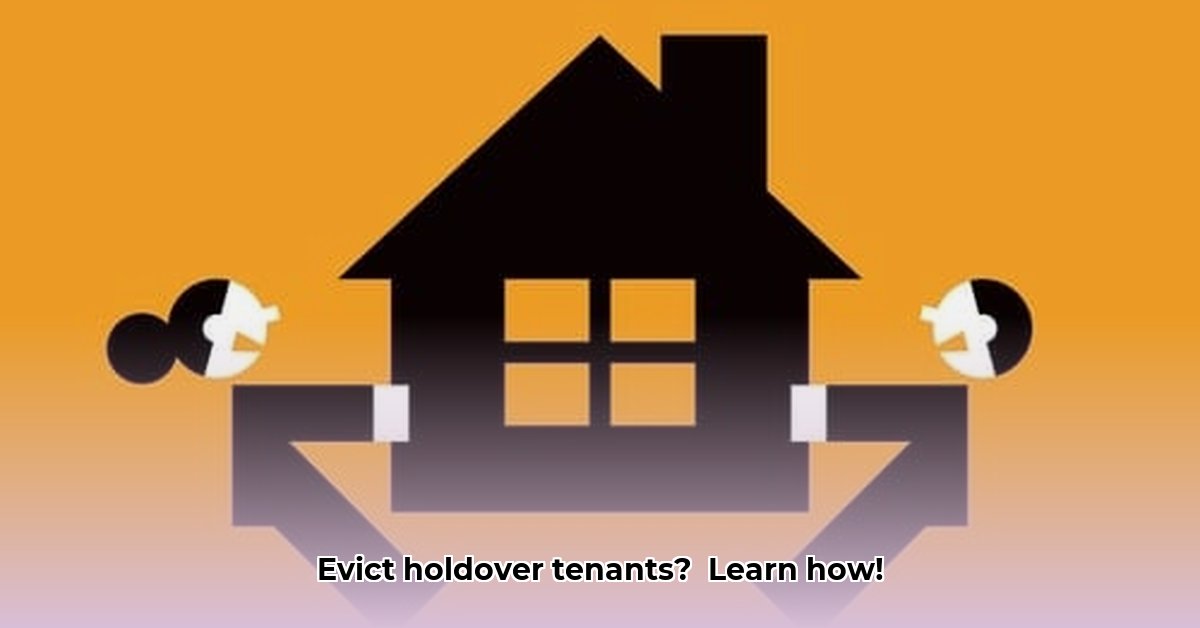
Understanding Holdover Tenancies and State Laws
A holdover tenancy occurs when a tenant remains in a rental property after their lease agreement expires. This situation can be legally complex and stressful for landlords. This guide provides actionable steps to navigate the process, focusing on [State Name] law. However, state laws vary significantly, so consulting a legal professional is crucial. Failing to understand your state’s specific laws can lead to costly legal challenges. Did you know that improper notice alone can invalidate your legal standing? This guide helps you avoid such pitfalls.
Navigating [State Name]'s Holdover Tenancy Laws
[State Name]'s laws regarding holdover tenancies dictate the required notice period, the process for initiating eviction, and whether accepting rent after lease expiration creates a new month-to-month tenancy. Understanding these specifics is paramount. For example, in some states, accepting rent implies a month-to-month agreement, changing your course of action. In others, it doesn't. Failing to understand this nuance could drastically impact your legal strategy. Specific statutes and case law in [State Name] will govern your actions. Researching these beforehand saves considerable time and expense in the long run.
Step-by-Step Guide to Handling Holdover Tenancies
This section provides a detailed, step-by-step plan to resolve holdover tenancies. Remember, prompt action is key to minimizing potential complications and costs.
Thorough Lease Review: Carefully review your lease agreement. Does it explicitly define the terms of lease renewal or termination? Are there clauses covering holdover situations? Many legal issues stem from poorly worded or ambiguous lease agreements. A clear, comprehensive lease is your first line of defense.
Serve Legal Notice to Vacate: [State Name] law mandates a specific type of notice (usually written) and a minimum notice period. This notice must clearly state the tenant's required departure date. Ensure proper service documentation (certified mail with return receipt requested is recommended). Improper service could later invalidate your legal actions.
Meticulous Documentation: Maintain detailed records of all communication with the tenant – emails, letters, calls, texts, and in-person conversations. Document the date and time of each interaction. Comprehensive documentation is your crucial evidence should legal action become necessary.
Consider a "Cash-for-Keys" Agreement: In some cases, offering a financial incentive for peaceful departure can be more efficient than formal eviction. While potentially costly, it can save legal fees and time. However, consult legal counsel to ensure compliance with [State Name]'s laws before making an offer.
Initiate Formal Eviction (If Necessary): If the tenant fails to vacate after proper notice, you may need to file an unlawful detainer lawsuit in the relevant court. This process is complex and time-consuming. Seeking legal guidance from an attorney specializing in landlord-tenant law is strongly recommended at this stage.
Risk Mitigation Strategies: Proactive Landlord Practices
Proactive measures significantly reduce the risk of holdover tenancies.
Comprehensive Lease Agreements: Use clear, unambiguous lease agreements that cover lease renewal, termination, and holdover tenancy consequences. Consider professional legal review of your lease to avoid ambiguities that could later be exploited.
Thorough Tenant Screening: Invest in robust tenant screening, including credit and background checks, reference verification, and income verification. While not foolproof, this significantly mitigates risk. A thorough screening process can save you considerable trouble and expense down the line.
Consistent Communication: Maintain open communication with tenants to address concerns promptly. This often prevents misunderstandings that might escalate into holdover situations. Regular communication fosters a better tenant-landlord relationship, reducing potential conflicts.
Legal Considerations and Tenant Rights
Both landlords and tenants have legal rights and responsibilities under [State Name] law. It is illegal to forcibly remove a tenant without following proper legal procedures. Ignoring tenant rights can have severe legal repercussions. Understanding these aspects is crucial for protecting yourself from legal liabilities.
Tenant Rights: Familiarize yourself with [State Name]'s laws regarding tenant rights. Violating these rights can lead to serious legal penalties.
Landlord Responsibilities: Know your responsibilities as a landlord. Failing to meet these obligations can lead to legal action and fines.
Conclusion: Seeking Professional Legal Counsel
This guide offers a general framework. The complexities of landlord-tenant law, especially concerning holdover tenancies, warrant professional legal advice. Consulting an attorney early can save you time, money, and significant stress. The cost of legal advice is often far outweighed by the potential costs of improperly handling a holdover tenancy. Remember, each situation is unique, and professional guidance is invaluable. Do not attempt to navigate this alone.
Appendix: Sample Notice to Vacate (For [State Name])
(Disclaimer: This is a sample only. Consult with a [State Name] attorney for a legally compliant Notice to Vacate form.)
[Insert State-Specific Sample Notice to Vacate] This section would include a sample notice tailored to the specific requirements of [State Name] landlord-tenant law.